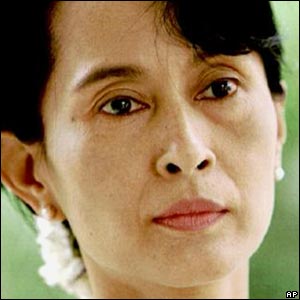Myanmar court likely to find Aung San Suu Kyi guilty, observers
 Yangon - While hope may spring eternal, the likelihood of a Myanmar court finding opposition leader Aung San Suu Kyi innocent Friday is slim, analysts said on the eve of the expected verdict.
Yangon - While hope may spring eternal, the likelihood of a Myanmar court finding opposition leader Aung San Suu Kyi innocent Friday is slim, analysts said on the eve of the expected verdict.
Suu Kyi, 64, stands accused of breaking the terms of her house detention by allowing US national John William Yettaw to swim to her home-cum-prison on May 3 and stay, albeit uninvited, in her compound until the night of May 5.
The Nobel Peace Prize laureate, who has spent 14 of the past 20 years under house detention, faces a minimum of three years in jail and a maximum of five if found guilty by a special court set up in Yangon's Insein Prison.
Suu Kyi's two housekeepers, Khin Khin Win and Win Ma Ma, face similar charges for accommodating Yettaw's surprise visit and Yettaw faces several months in jail for breaching various laws, including a prohibition against swimming in Inya Lake, on which Suu Kyi's family compound sits.
Past court cases have demonstrated that Myanmar's judiciary has no independence from the country's ruling military junta, which wants Suu Kyi to remain out of politics until after a general election planned next year, observers said.
So a guilty verdict was widely expected. But to placate a new onslaught of international criticism that it was sure to spark, the authoritarian regime was expected to suspend Suu Kyi's sentence shortly after it is issued.
"She will be sentenced to jail because this regime never backs down, but maybe a few days or weeks later, they may suspend the sentence and place her under house arrest again," said Win Min, a political analyst at Chiang Mai University in northern Thailand.
The same thing happened to Brigadier General Khin Nyunt, once Myanmar's military intelligence chief who fell from grace in 2003.
Khin Nyunt was found guilty of corruption and sentenced to 44 years in prison, but his sentence was quickly suspended and changed to house arrest.
There was little hope that Suu Kyi would be found innocent because her freedom might galvanize opposition to the government's scheduled general election in 2010 that promises to be neither free nor fair.
"If you ask 10 Burmese people whether the court will find her innocent, maybe one will say yes, nine no," said one Yangon resident who asked to remain anonymous.
Suu Kyi's National League for Democracy (NLD) party won the last Myanmar election in 1990 by a landslide even though she was in jail at the time of the polls.
The NLD, barred from power for the past 19 years, is unlikely to contest the 2010 polls because the 2008 constitution, pushed through my the military, guarantees the generals control over any elected government.
Analysts said Suu Kyi, deemed the only opposition politician the ruling regime fears and a democracy icon to her people, could seriously threaten the military's so-called political reforms, which it has dubbed a "seven-step roadmap" to democracy.
"They want to keep her out of communication with her followers, so no one knows whom she supports in the next election," Win Min said.
Given this political reality, even Suu Kyi is not optimistic about Friday's court outcome.
"Daw [Mrs] Aung San Suu Kyi is prepared for the worst," her attorney Nyan Win said Tuesday after the court's final hearing.
Suu Kyi's case began May 11. While the prosecution was allowed to present 14 witnesses, her defence were allowed two.
Her lawyers argued that Suu Kyi, whose latest six-year detention term had ended on May 27, had informed authorities of Yettaw's previous visit to her Yangon compound in November when he gave her servants a copy of the religious text the Book of Mormon but officials chose to do nothing about it and in fact permitted Yettaw to re-enter the country in May.
Besides this case, the democracy icon also faces a civil lawsuit over the ownership of her family compound. (dpa)